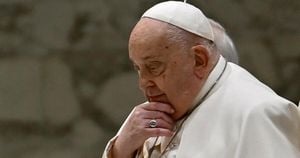Germany’s conservative Christian Democratic Union (CDU) emerged as the clear winner in the 2025 federal election, setting the stage for Friedrich Merz to become the next chancellor. Alongside the CDU, the far-right Alternative for Germany (AfD) made significant strides, capturing its highest electoral share to date. Meanwhile, incumbent Chancellor Olaf Scholz's Social Democratic Party (SPD) faced its worst defeat since World War II, marking turbulent shifts in the German political sphere.
With 83.5% voter turnout, the highest since German reunification, the election results prompted immediate reactions from party leaders. Merz, celebrating his party’s expected 28.5% vote share, wasted no time rallying his supporters. “Let’s get the party started,” he proclaimed, emphasizing his intention to quickly form a government. His upcoming task is complicated, as coalition negotiations are anticipated to be lengthy and challenging.
Positioning itself as the second-largest party, the AfD garnered around 20.5% of the vote. Alice Weidel, its co-leader, enthusiastically declared, “We have achieved a historic result,” to her supporters, pointing to the party’s recent surge as indicative of shifting public sentiment.
The SPD, currently under Scholz, received just 16.5% of the votes, signaling substantial voter discontent with the previous ruling coalition, which included the Greens and the Free Democratic Party (FDP). Political experts note this is the SPD's first time not being one of the two leading parties, as highlighted by academic Werner Krause, who stated, “The SPD... is no longer one of the two major political forces.” This historic downturn reflects significant dissatisfaction with the government's handling of the economy and rising immigration issues, which have dominated recent public discourse.
The election itself unfolded under the shadow of pressing national concerns, including the sluggish economy and immigration policy, exacerbated by high inflation rates and rising energy costs. The once-stable coalition strategies are now viewed as inadequate to address the challenges at hand. Merz has capitalized on this sentiment, prioritizing economic revitalization and addressing security concerns.
Despite their electoral success, the CDU is not expected to navigate the coalition seas without obstacles. Previously unthinkable options such as working with the AfD are off the table, as CDU leaders stress their commitment to keeping the far-right party out of power. Merz reiterated this stance during his victory speech, stating categorically, “I always said there was no question of a coalition with the AfD.” This “firewall” against extremist parties reflects the mainstream political consensus aimed at protecting Germany's democratic integrity.
Coalition scenarios are, hence, narrowing down. Analysts speculate about potential partnerships—either returning to the previous coalition format with the SPD or rallying with the Greens. The latter option, initially dismissed during the campaign, has recently gained traction, especially from Bayern's CSU leader, Markus Söder, who commented on-air, “A coalition with the Greens isn’t off the table now.” This marks a notable shift from pre-election rhetoric, where both mainstream parties largely ruled out alliances with each other, focusing instead on opposing the AfD.
The rise of the AfD, meanwhile, embodies changing political tides. Once marginalized, the party's jump reflects broader reactions to recent violent incidents connected to migrant backgrounds, which have intensified debate around immigration policy. Their political messaging, which includes calls for “remigration,” resonates particularly within certain demographics—most prominently, younger voters and those with lower education levels.
Among various voting demographics, key trends emerged during this election. For one, urban areas exhibited polarized voting patterns, particularly against the backdrop of the AfD's intensive campaigning directed at security issues. Notably, the younger electorate has trended away from mainstream parties, increasingly voting for both the far-right AfD and the far-left Die Linke party. Commentators have remarked on the stark generational divide, where older voters continue to lean toward traditional parties like CDU and SPD.
With many voters voicing concerns about economic management and immigration, the path forward for Merz promises to be complex, emphasizing both negotiation strategy and governance. Scholz’s coalition faltered after internal disputes and faced criticism for failing to effectively address Germany's economic challenges, leaving empty seats for Merz to fill.
The potential coalition talks, now on the horizon, will require deft political maneuvering from Merz if he seeks to establish a stable government. A looming question remains whether the new coalition will effectively address the issues at the forefront of voter minds—economic stability, security, and social fairness.
Analysts predict significant diplomatic shifts under Merz, particularly as he prioritizes economic independence from the US and engages with other European powers. His intentions to pivot Europe toward greater self-reliance resonate amid growing skepticism about transatlantic ties, igniting discussions around NATO’s future alignment.
For now, the 2025 German federal elections reflect significant shifts, not only within Germany but potentially across the broader political framework of Europe, as party dynamics continue to evolve. The results of this election signal not just the displacement of traditional parties but also the rise of far-right populism—a development few had expected yet many have now had to reckon with.
The coming weeks will test Merz’s ability to navigate the tumultuous waters of coalition-building amid heightened scrutiny on how the new government will respond to the desiderata of its constituents.



